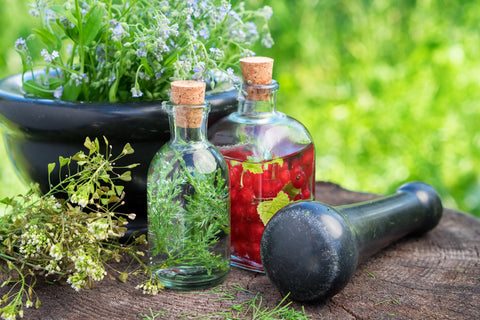Medicinal Plants: Healing from Your Home Garden

UPWARDS IN THE GARDEN
Medicinal Plants: Healing from Your Home Garden
By Mark Zuleger-Thyss
Eating to improve your health? Try growing your own medicine.
If you want to plant an herb garden in or around your home, it is not difficult - a small garden needs loving care, time – and patience. In addition to spices and herbs, you can also cultivate medicinal plants and use the power of nature to treat minor illnesses yourself.
First you should consider where this small garden should be built – in your backyard, on a terrace or a balcony. Even simple beds with a few medicinal herb plants are suitable for anyone’s needs. You can also grow your own kitchen or medicinal plants with the help of a small spiral of herbs* or individual pots. However, the plants mustn't be exposed to any exhaust fumes from cars traveling by your house. Otherwise, your plants will absorb unhealthy environmental toxins.
Just as important as the type of herb garden are the plants that are grown. All herbs have different needs. Consider this when starting an herb garden – knowing which are annuals and which are perennials is essential when planning and planting a culinary garden.
Exposure to the sun is particularly problematic: while Mediterranean herbs such as thyme, lemon balm, or rosemary prefer bright, sunny places, peppermint and bloodroot do not tolerate direct sunlight very well.
Kitchen herbs are not the only plants that can be grown in your own special plot. Medicinal plants traditionally used to treat minor ailments can also be cultivated on your balcony. The most popular medicinal plants include marigolds, which are prevalent in many spaces, and not just because of their beautiful yellow flowers. With olive oil and beeswax, other dried flowers can be mixed together to make creams with anti-inflammatory and decongestant properties.
Lavender is also a good choice for medicinal herb gardens. The plant is not only an eye-catcher: a tea made from two teaspoons of lavender flowers and boiling water helps with stress and can calm you down. Chamomile is an all-time favorite: it is said to have a soothing effect on stomach problems, for example. Inhalation of the scent of chamomile flowers also helps with colds and runny noses.
Fortunately, herbs are relatively easy to grow. They are even easier to harvest and preserve for future use in cooking or for medicinal purposes.
*Spiral of Herbs
An Herb Spiral is a highly productive and energy efficient, vertical garden design. You can stack plants horizontally and vertically to maximize space. It’s a practical and attractive solution for urban gardeners. An herb spiral design is typically 5 – 6.5ft wide in diameter at the base and rises to 3.2 – 4.2ft. The center of the spiral is at the highest point. The spiral ramp provides a planting area large enough to fit in all your common culinary herbs.
© 1996 - 2021 Mark Zuleger-Thyss, Garden of Healing. All rights reserved.
